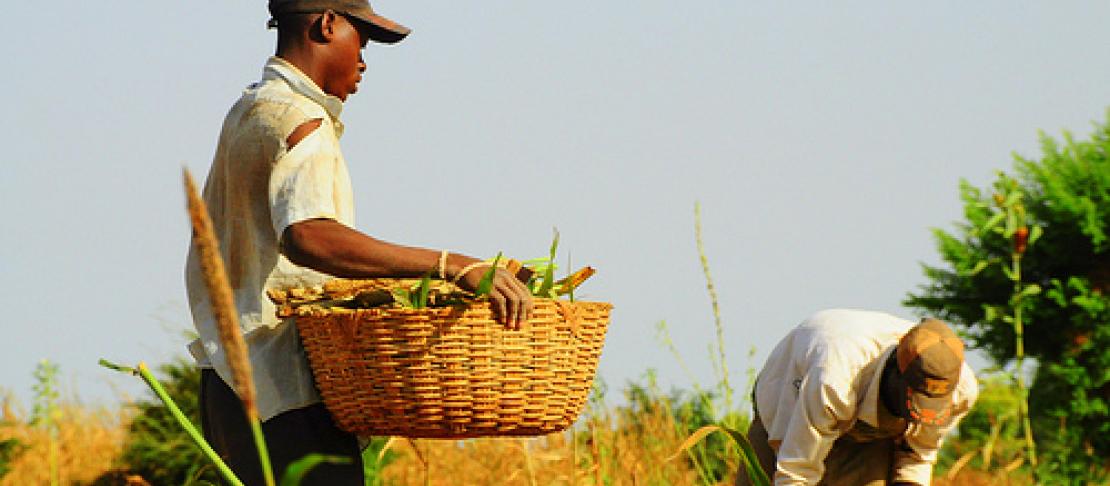The long toll of heat shocks in poor countries

by Sonja Vermeulen
Cliquez pour la version française
Food price highs are with us yet again. For certain commodities there is a direct link to climate. Severe heat and drought in USA have sent maize over $8 a bushel for the first time in history. But do extreme “heat events” have longer-term effects on economies? Some intriguing answers appear in Temperature shocks and economic growth: evidence from the last half century, an econometric study by Melissa Dell, Benjamin Jones and Benjamin Olken, which has been available as a working paper since the major food price crisis of 2008, and is now published formally.
The study analyzes the relationship between anomalous temperatures and economic performance in 125 countries between 1950 and 2003. In short, rich countries do not show significant economic impacts from temperature shocks. But in poor countries – which also tend to be hot and agricultural* – one standard deviation upwards in mean annual temperature reduces economic growth by 0.69 percentage points. This means that years that are 1C hotter than average, which occur about once every 15 years, are associated with a mean reduction in economic growth of 1.3 percentage points.
Unsurprisingly, the impact of temperature on agriculture is key. A 1C rise is linked to a 2.7% reduction in growth in agricultural outputs. The biophysical basis is fairly clear-cut. Temperature affects water availability and evapotranspiration, plus plant physiology directly. Studies in the USA and sub-Saharan Africa have shown how maize yields plummet as growing season temperatures exceed 30C thresholds. In turn, lost agricultural productivity can have considerable knock-on effects for other sectors.
But Dell and co-authors’ study shows that heat shocks have negative impacts on industry and on political stability that cannot be attributed solely to agriculture. If we extrapolate the authors’ findings beyond macro-economic performance to food security, the implications are stark. Already food-insecure people will lose out even more, not only through reduced food production, but also through upsets to food processing and distribution, to wage-earning opportunities, and to maintenance of infrastructure and services. Food insecurity needs to be tackled both through agricultural production and through strengthening poor people’s diverse but fragile “entitlements” to food.
Dell and co-authors emphasize that heat shocks in poor countries have significant negative effects on capacity for economic growth, not merely on immediate output levels. Just as poor farmers have reduced ability to re-invest following failed harvests, so do poor countries struggle to expand following economy-wide temperature shocks. Worse, the statistics demonstrate that recovery time is up to ten years.
Even worse still, and beyond the authors’ analyses, the frequency and intensity of extreme heat events are likely to escalate in future. An alarming new category of “extremely hot summers” (PDF) more than three standard deviations above the mean, has emerged globally this century. For policy-makers and poor households, managing for the extremes (rather than managing for the averages) will be increasingly important to future food security.
*Note: The authors note that it is not possible definitively to separate the variables of poorness (GDP), mean temperature and share of agriculture in GDP, but that in the regression analysis the effect of temperature shocks appear through being poor, not through being hot or being agricultural. Note that the classification of poor and rich countries does not match “developed countries” (World Bank “high-income”) and “developing countries” (World Bank “middle-income” and “low-income”); for example South Africa and Colombia are classed as rich countries.
Links
- Drought, food prices fan fears of new crisis | Reuters 10 Aug 2012
- Dell, M., Jones, B.F. and Olken, B.A. 2012. Temperature shocks and economic growth: evidence from the last half century. American Economic Journal: Macroeconomics 4: 66–95. http://dx.doi.org/10.1257/mac.4.3.66
- Schlenker, W. and Roberts, M.A. 2009. Nonlinear temperature effects indicate severe damages to U.S. crop yields under climate change. Proceedings of the National Academy of Sciences 106: 15594-15598. http://dx.doi.org/10.1073/pnas.0906865106
- Lobell, D.B., Banziger, M., Magorokosho, C. and Vivek, B. 2011. Nonlinear heat effects on African maize as evidenced by historical yield trials. Nature Climate Change 1: 42-45. http://dx.doi.org/10.1038/nclimate1043
- Devereux, S. 2007. The impact of droughts and floods on food security and policy options to alleviate negative effects. Agricultural Economics 37: 47-58. http://dx.doi.org/10.1111/j.1574-0862.2007.00234.x
- Hansen, J., Sato, M. and Ruedy, R. 2011. Climate variability and climate change: The new climate dice. http://www.columbia.edu/~jeh1/mailings/2011/20111110_NewClimateDice.pdf
This is the September 2012 installation of AgClim Letters, a monthly e-bulletin on science and policy written by Sonja Vermeulen, Head of Research for CCAFS. Sign up to receive AgClim Letters bulletin and read past bulletins. Your comments are welcome below.